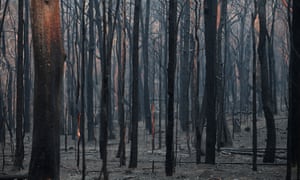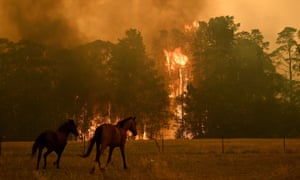Another adversarial royal commission risks repeating past recommendations without addressing the new element – climate change
Like hundreds of other volunteer firefighters, Jim Smith spent much of the summer on the back of a truck on the New South Wales south coast, trying to get his radio to work.
“You’ve got your normal channel, you’ve got your divisional channel [for] who you’ll be working under, and another channel,” he says. “So it’s always confusing.”
Emergency services changed from analog to digital radios several years ago, but in the heart of a fire zone, with everyone trying to contact incident control and no two state firefighting organisations using the same radio protocols, it’s still hard to get through.
“I know, for instance, we had a Queensland strike team down with us and we had great difficulty talking to them,” Smith says. “We need to spend a lot of time getting a national standard so everyone is able to contact each other.”
He hopes that establishing that national radio standard will be one of the issues tackled by the national royal commission into the 2019-20 bushfires.
The royal commission, chaired by former defence force chief Mark Binskin with co-commissioners Dr Annabelle Bennet, a former federal court judge, and Prof Andrew Macintosh from the Australian National University’s climate change institute, was announced on Thursday.
It is designed to look into national coordination of natural disaster preparedness and response in the wake of the most prolonged and widespread bushfire season in Australia’s history, which resulted in the loss of 33 lives, almost 2,000 homes, and more than 7.7m hectares of farm and bushland.“You’ve got your normal channel, you’ve got your divisional channel [for] who you’ll be working under, and another channel,” he says. “So it’s always confusing.”
Emergency services changed from analog to digital radios several years ago, but in the heart of a fire zone, with everyone trying to contact incident control and no two state firefighting organisations using the same radio protocols, it’s still hard to get through.
“I know, for instance, we had a Queensland strike team down with us and we had great difficulty talking to them,” Smith says. “We need to spend a lot of time getting a national standard so everyone is able to contact each other.”
He hopes that establishing that national radio standard will be one of the issues tackled by the national royal commission into the 2019-20 bushfires.
The royal commission, chaired by former defence force chief Mark Binskin with co-commissioners Dr Annabelle Bennet, a former federal court judge, and Prof Andrew Macintosh from the Australian National University’s climate change institute, was announced on Thursday.
But it is specifically not tasked with looking at Australia’s carbon reduction policies.

The royal commission has also been asked to look at better coordination of national firefighting resources and the formation of national building standards for bushfire zones.
Some problems seem eternal
With the exception of the oblique mention of climate change, and that for the first time this is a national inquiry and not a state-based instrument, there is little difference between the scope of this royal commission and dozens of inquiries in the past.
Smith, a former deputy commissioner of Fire and Rescue NSW, now volunteer deputy captain of the St Georges Basin volunteer Rural Fire Service brigade, says that some problems in emergency services — like failing radio communications on the fire ground — seem eternal.“Every fire I’ve ever been on there’s communication issues,” Smith says. “When we do our after-action reviews it’s probably the first thing that ever comes up.”
Others, like facing up to worsening fire conditions under climate change, are more urgent, which is why he was one of 23 former fire and emergency services chiefs who wrote to Scott Morrison in April warning that Australia was unprepared for worsening natural disasters under climate change.
For each of these eternal problems there is a stack of reviews, parliamentary inquiries, coroners’ reports, internal reports and royal commissions. There are more than 50 reports dating back to the inquiry into the 1939 Black Friday bushfires, each with its own set of recommendations that have mostly not been implemented.
The notable exception is the Victorian royal commission into the 2009 Black Saturday bushfires, which made 67 recommendations that, according to the final monitoring report in 2016, were mostly completed.
"It's ultimately going to be judged by the actions that governments take"
Black Saturday, when 173 people were killed on one day, mostly in the towns of Marysville and Kinglake, remains the deadliest bushfire disaster in Australian history.
Left uncompleted was a recommendation to burn 5% of the state’s landmass each year in hazard reduction burns. That was changed in 2016 in favour of a “risk reduction target”, when it was found that a hectare quota encouraged the burning of large, remote areas, rather than targeted fuel reduction around homes. Since then, Victoria’s former environment minister says, climate change has made it difficult to safely undertake any kind of substantial prescribed burning program.
Even after 2009, the adoption of recommendations outside Victoria was ad hoc, other than the new national fire danger ratings index and public warning systems.
“There is an opportunity for a lot of stuff that’s been done in various states to be put into national standards,” Smith says.
He says the national fire danger ratings, and attendant warnings, should also be reviewed. Currently all Australian jurisdictions advise residents to evacuate if catastrophic bushfire conditions are forecast.
Victoria this summer also advised mass evacuations of areas where the forecast fire danger rating was extreme, but did not use its state of disaster powers to force evacuations.
‘We have to deal with the elephant in the room’
A former director general of the NSW Parks and Wildlife Service, Brian Gilligan, says a national royal commission can serve a “useful purpose” but only if the terms of the inquiry are open.“Inquiries are only as good as their terms of reference, and they’re ultimately going to be judged by history by the actions that governments take in response to them,” Gilligan says. “And that’s the test.”
The challenge, Gilligan says, “is what the emphasis will be”.
“If we’re going to have too much of a focus just on the things that we already know, for example the place of hazard reduction ... then do we really need to go to all this trouble?” he says. “We have to deal with the elephant in the room that is the implication of climate change on all of this.”
Craig Lapsley, who was the inaugural emergency management commissioner in Victoria and oversaw the implementation of the recommendations from the 2009 royal commission, says the impact of global heating on Australia’s bushfire risk has solidified in the 11 years since.
Black Saturday occurred in the “traditional part of the day, it was the afternoon”, Lapsley told Radio National. “These fires [in 2019-2020] have been raging in the evening, in the night ... that’s climate.”
Emergency management experts have said they do not want a repeat of the Black Saturday royal commission, which was called just two days after the disaster and was highly adversarial. The spectacle of a flock of barristers picking apart fire chiefs in the witness box left the rank-and-file firefighters, both volunteer and professional, feeling they had been blamed for conditions beyond their control.
That is counter-productive to producing long-lasting reforms and cultural change within fire agencies, Swinburne University’s Dr Graham Dwyer says.
Royal commissions, Dwyer says, are designed to find blame and expose corruption. In 2009, that blame often landed on firefighters, causing “a great deal of shame” among volunteers who felt guilty that they had not been able to avert catastrophe.
“How can we actually learn when there is so much blame being heaped upon people who are probably experiencing a lot of post-traumatic stress?” Dwyer says.
Dwyer says it is possible to learn the necessary lessons from national disasters without a public inquiry, and praises the Victorian premier, Daniel Andrews, for instead asking the inspector general of emergency management to conduct an independent inquiry.
The Andrews government has said it will review the letters patent of the national royal commission before making a final decision on whether to sign up. Western Australia and the Australian Capital Territory have also criticised the inquiry for not addressing Australia’s emissions reduction policies; saying it should address the climate emergency itself, and not just its impacts.
Smith says there is a limit to what better land management practices, and better resourcing of firefighters, can do to contain the growing bushfire threat.
“Having fought these fires back on the truck again, this season especially, and my memories from 40 years of firefighting, these fires are getting worse and worse,” Smith says.
“I don’t like to think what the next one will be like in five or six years.”

No comments:
Post a Comment